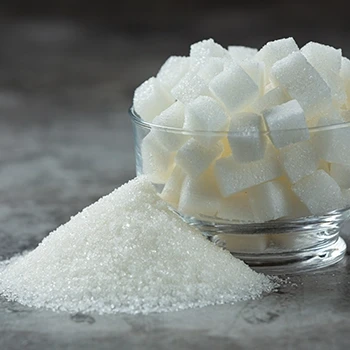As a doctor, I often advise my patients on the importance of managing their sugar intake as part of a balanced diet.
It's common for patients to be unaware of the amount of sugar they consume and its potential effects on their health, including concerns about testosterone levels.
With my background in nutrition and medicine, I have delved into medical research to understand this issue more deeply.
In collaboration with fitness experts, I've explored the relationship between sugar consumption and health, particularly focusing on its role in testosterone levels.
Let's explore this further.
Quick Summary
- Reducing sugar intake can help mitigate insulin resistance, which may lead to increased testosterone levels.
- Excessive sugar consumption is linked to various health issues, including impaired insulin sensitivity, metabolic syndrome, and type 2 diabetes.
- A study by the NIH found that sugar intake can cause an immediate drop in testosterone levels in men, with a 25% decrease in mean testosterone levels remaining suppressed for 120 minutes.
- In my professional opinion, patients who reduce their sugar intake often report improved energy levels and overall health, suggesting a positive correlation between reduced sugar consumption and testosterone levels.
Can Sugar Lower Testosterone Levels?

As a nutritionist, I've observed that patients who reduce their sugar intake frequently report an increase in energy and an overall improvement in health. For example, one of my patients was battling with low energy levels.
After reducing his sugar consumption, based on the NIH's findings that sugar can lower testosterone levels due to insulin resistance [1], he noticed a significant improvement in his overall well-being.
Before we take a closer look at how sugar ingestion affects testosterone levels and other areas of your health, let’s look at what to look for on product labels that you need to recognize as added sugar.
The following is a list of common added sugars that you should avoid:
- High-fructose corn syrup
- Brown sugar
- Corn sweetener
- Corn syrup
- Fruit juice concentrates
- Malt sugar
- Molasses
- Sugars ending in “ose”: dextrose, fructose, glucose, lactose, maltose, sucrose
Let’s take a closer look at how sugar affects testosterone levels.
How Does Sugar Affect Testosterone Levels?
Sugar affects testosterone levels in two ways: an abrupt decrease that recovers over a couple of hours and a more long-term effect by causing insulin resistance and obesity, thus creating a vicious cycle.
One study by NIH of adult males concluded that sugar intake could affect normal testosterone levels immediately [2].
Researchers assessed the impact of oral glucose load on 74 men ages 19-74, who had varying glucose tolerance, and found an abrupt drop in total and free testosterone levels.
The participants underwent a 75-g oral glucose tolerance test, with researchers recording blood samples at 0, 30, 60, 90, and 120 minutes. The participants experienced a 25% decrease in mean testosterone levels that remained suppressed for 120 minutes.
BMI and glucose tolerance were not factors.
According to NIH, excessive sugar intake can impact testosterone levels in men over the long term by leading to impaired insulin sensitivity which research shows directly decreases the Leydig cell testosterone secretion [3].
According to a study in the National Library of Medicine, a high body mass index (BMI) in the overweight or obese range can decrease serum testosterone levels [4].
In turn, low testosterone can cause weight gain and more fat.
If you want to know your BMI ratio, check out our BMI calculator.
Health Risks of High Sugar Intake

An increased risk of low hormone levels is not the only health concern caused by high sugar intake.
Let’s take a look.
1. Weakens Immunity
If your diet consists of high sugar-sweetened beverage intake or loads of refined carbs, you may be suppressing your immune system.
According to NIH, white blood cells need vitamin C to help ward off any threats, and sugar can interfere with vitamin C absorption [5].
2. Heightens Inflammation
A study by the Harvard Medical School notes that inflammation is vital in the body’s healing process, but chronic inflammation can lead to many health problems [6].
These include:
- Heart disease
- Diabetes
- Cancer
- Arthritis
- Crohn’s disease
- Ulcerative colitis
Sugar can promote the production of free fatty acids in the liver, which may initiate an inflammatory response.
A 2014 study by NIH shows that individuals who reduced their sugar intake also reduced the inflammatory markers in their blood [7].
“Added sugar consumption increases heart disease risk factors such as obesity, high blood pressure, and inflammation. High-sugar diets have been linked to an increased risk of heart disease.”
- Jillian Kubala, MS, RD
3. Increases the Risk of Chronic Diseases

Research by NIH shows the direct link between added sugars and chronic diseases, particularly hypertension, diabetes, and obesity [8].
The good news is that research by the National Institute of Health supports that reducing sugar intake can proportionally reduce the risk of chronic diseases; the more sugar you eliminate, the more significant reduction in risk [9].
4. Ages Your Skin Prematurely
Age is not just a number, but harmful compounds called advanced glycation end products (AGEs), created when sugar in the blood attaches to protein, can affect your appearance.
According to NIH, while AGEs are a part of the normal aging process, excessive levels can lead to premature wrinkles and other aging-related skin properties [10].
5. Harms the Liver
Excessive glucose ingestion can result in a build-up of fatty acids in the liver, which can damage your liver similarly to alcohol and lead to a condition called non-alcoholic fatty liver disease (NAFLD).
This condition is usually not accompanied by any symptoms, but, acoording to Mayo Clinic, occasionally individuals report fatigue and pain in the upper right abdomen [11].
6. Affects Fertility
Excessive sugar consumption can negatively impact male fertility. High sugar intake contributes to insulin resistance, inflammation, and oxidative stress, all of which may impair sperm quality and reduce testosterone levels.
These factors collectively hinder reproductive function and can contribute to fertility issues in men.
A study cited by the National Library of Medicine indicates that men with high sugar intake have lower testosterone levels, which can affect fertility and sexual health [12].
7. Disrupts Sleep
High sugar intake, especially before bedtime, can disrupt sleep by causing fluctuations in blood sugar levels.
Poor sleep is linked to decreased testosterone production. Disrupted sleep patterns, influenced by sugar, may impair the natural hormonal balance essential for maintaining optimal testosterone levels in men.
Research from the Sleep Foundation indicates, high sugar diets can disrupt sleep patterns, indirectly affecting testosterone production, which is primarily regulated during sleep [13].
Do You Have to Refrain From It?

For individuals with compromised glucose tolerance, avoiding as much sugar as possible, mainly the added sugars listed earlier in the article, is in their best interest.
It is quite hard to eliminate all sugar because it naturally occurs in many foods like fruit and veggies.
Individuals with normal glucose tolerance should avoid too much fructose and other added sugars, but this doesn’t mean you can’t enjoy the occasional sweet or sugary drink.
The results are even more remarkable when they cut out sugar and incorporate a natural testosterone-boosting supplement in the mix.
FAQs
How Much Does Sugar Lower Testosterone?
Sugar can lower testosterone by as much as 25% for up to two hours after consumption. Researchers at Massachusetts General Hospital also reported the abrupt drop is not dependent on BMI or glucose tolerance.
How Long Does It Take for Sugar to Reduce Testosterone?
Sugar can reduce testosterone immediately, causing a decrease that lasts a couple of hours. Sugar can also cause long-term effects on testosterone by causing increased body fat and impaired insulin sensitivity.
Can Too Much Sugar Affect Athletic Performance?
Too much sugar can affect athletic performance, which is why the type of sugar and timing of consumption is essential. For example, a sugar-heavy meal your body doesn’t have time to digest can sabotage performance.
References:
- https://pubmed.ncbi.nlm.nih.gov/18319314/
- https://pubmed.ncbi.nlm.nih.gov/22804876/
- https://pubmed.ncbi.nlm.nih.gov/15713702/
- https://www.ncbi.nlm.nih.gov/pmc/articles/PMC3955331/
- https://www.ncbi.nlm.nih.gov/pmc/articles/PMC7400679/
- https://www.health.harvard.edu/staying-healthy/understanding-acute-and-chronic-inflammation
- https://pubmed.ncbi.nlm.nih.gov/24418247/
- https://www.ncbi.nlm.nih.gov/pmc/articles/PMC5421126/
- https://www.ncbi.nlm.nih.gov/pmc/articles/PMC5577881/
- https://www.ncbi.nlm.nih.gov/pmc/articles/PMC3583887/
- https://www.mayoclinic.org/diseases-conditions/nonalcoholic-fatty-liver-disease/symptoms-causes/syc-20354567
- https://www.ncbi.nlm.nih.gov/pmc/articles/PMC10005661/
- https://www.sleepfoundation.org/physical-health/sleep-and-testosterone
About The Author
You May Also Like






